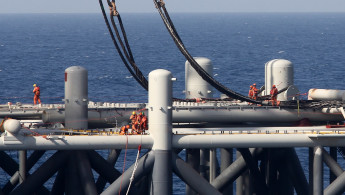Egypt to begin gas imports from Israel by mid-January: reports
The source, who spoke on condition of anonymity, said Israeli gas exports to Egypt will gradually reach 7 billion cubic metres, in line with earlier comments by Israeli companies confirming an increase to the amount of natural gas they plan to export to the neighbouring country.
A source in the Israeli energy industry estimated the value of gas was now $19.5 billion - $14 billion coming from Leviathan and $5.5 billion from Tamar.
In November, Egyptian and Israeli companies took control of the natural gas pipeline between Israel and Egypt.
The Tel Aviv stock exchange issued a statement saying that the ownership of the underwater pipeline would be passed to the joint venture between American firm Noble Energy, Israeli company Delek Drilling and their Egyptian partner East Gas Co. Their venture, called EMED, will purchase a 39 percent stake in the underwater pipeline from EMG for $518 billion.
The landmark contract signed in February 2018 between Israel and Egypt had stalled as the three companies attempted to strike a deal to buy out the other partners involved in the EMG pipeline that also faced legal challenges from the Egyptian government, Bloomberg reported.
Delek and Noble are both key partners in Israel’s Leviathan and Tamar gas fields on its Mediterranean coast. They have agreed to sell an estimated $20 billion worth of gas to Dolphinus Holdings in Egypt.
The closing of the EMG transaction marks the dawn of a new era for the Israeli energy market – Israel’s transition to the status of a regional natural gas exporter,” said Delek Drilling CEO Yossi Abu.
Twitter Post
|
“The Leviathan project is moving ahead on schedule ... and we expect to begin piping the gas from Leviathan already before the end of the year.”
The deal to supply gas to Egypt is expected to start in January.
Read more: Israel's moneymaking occupation exposed through Palestinian ban on its livestock
East Gas Co holds 50 percent of the venture while Delek Drilling and Noble own 25 percent each. The pipeline has the capacity of around 7 billion cubic metres (bcm) per year, which could be expanded to 9 bcm.
Israeli firm Delek Drilling’s shares went up by 6.1 percent in afternoon trading in Tel Aviv.
Out in the cold
However, while this deal is expected to make Israel an important regional energy exporter, Palestinians in Gaza face an energy crisis.
"Importing Israeli gas is a step towards the normalisation of relations between Tel Aviv and Cairo, and is the normalisation of the Israeli occupation," The New Arab's Diana Alghoul says.
Ties between Tel Aviv and Cairo have been warming in the last few years, especially since President Abdel Fattah al-Sisi seized power in a bloody coup from a democratically elected government in 2014.
Follow us on Twitter and Instagram to stay connected





 Follow the Middle East's top stories in English at The New Arab on Google News
Follow the Middle East's top stories in English at The New Arab on Google News


